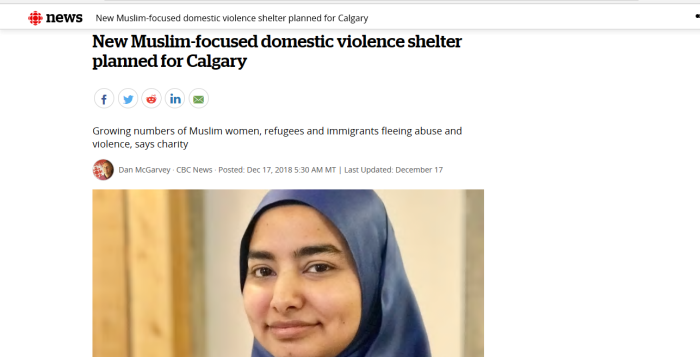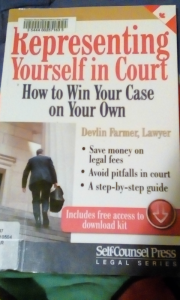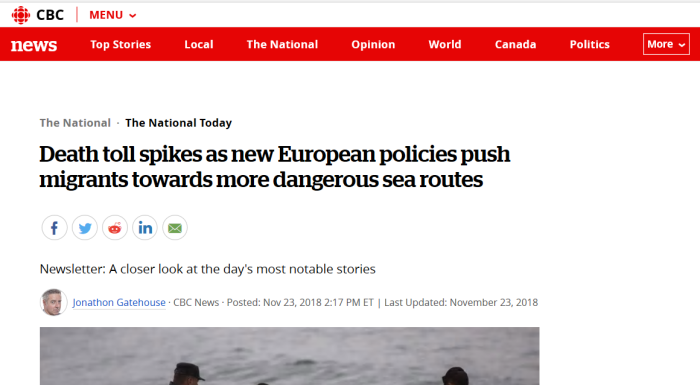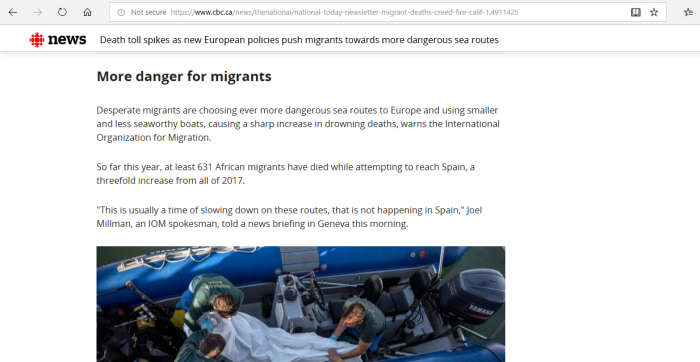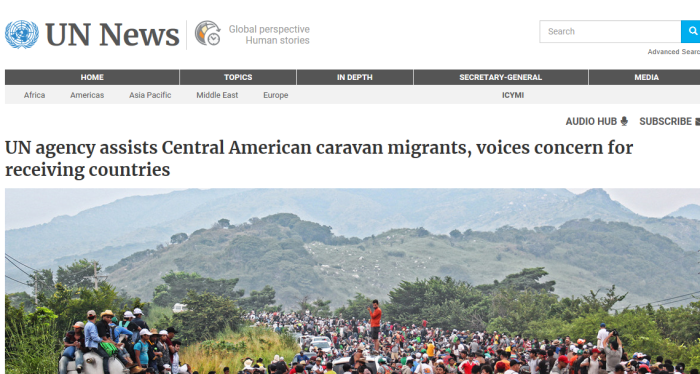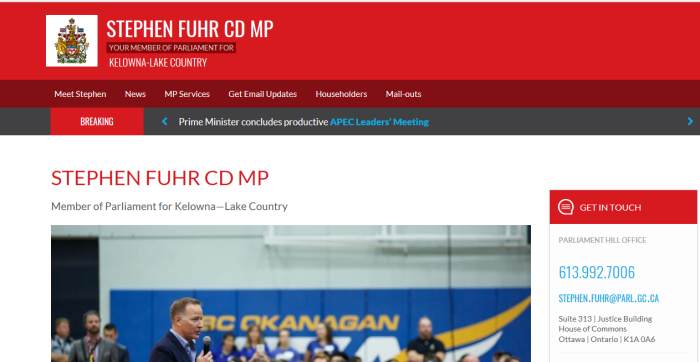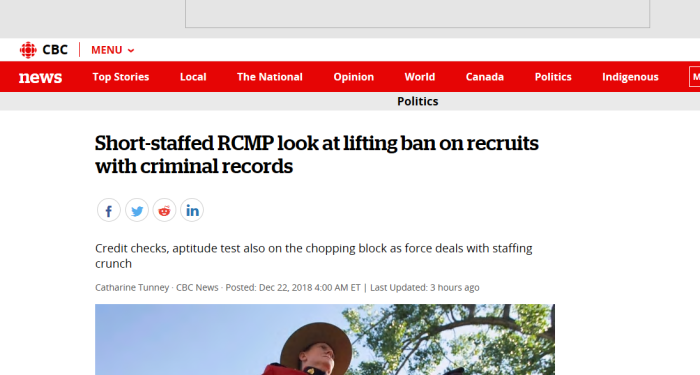
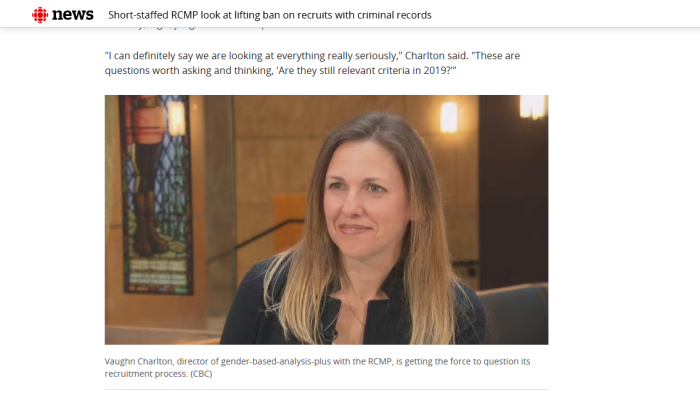
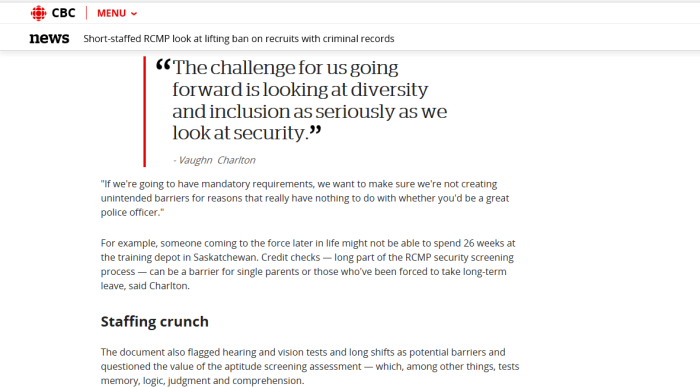
(Another Case Of Diversity Trumping Merit)
The Royal Canadian Mounted Police (RCMP) are facing a personnel shortage, and have come up with an interesting solution: drop all standards, and focus on diversity. No, this is not an exaggeration.
1. Proposed Changes
1/ Criminal record may not be a barrier to entry
2/ Credit problems not to be a barrier to entry
3/ Aptitude testing to be eliminated
4/ Hearing tests to be reduced or eliminated
5/ Vision tests to be reduced or eliminated
6/ Long stints at the acadmeny (training) to be reduced
7/ Focus to be on recruiting women and visible minorities
This CBC article, article is very difficult to parody, as it reads as one. Also, the comments are well worth checking out.
2. Article Quotations
The RCMP are taking a radical look at their recruitment strategy and could ditch credit checks and the ban on recruits with criminal backgrounds to help them rebuild their depleted ranks.
The Mounties have been plagued by staffing challenges in recent years and are looking at how to convince more women and visible minorities to don the red serge.
An internal document, obtained through access to information, suggests credit checks, the criminal background ban, the two-hour aptitude test and long stints at the training depot could all be eliminated from the hiring process as senior ranks try to make a career as a Mountie more attractive.
The document notes that some of the mandatory requirements can create barriers for communities the force wants to attract, including “groups more likely to have contact with the criminal justice system.”
It asks: Are we “tuned-in or tone deaf?”
The review exercise is the brainchild of Vaughn Charlton, the director of gender-based-analysis-plus with the RCMP.
She was brought over from Status of Women Canada in April 2017 at the request of then-commissioner Bob Paulson and tasked with focusing on gender and inclusion within the force.
“We need to stop assuming there’s only one kind of person who belongs in policing,” she said in an interview with CBC News.
“If we’re going to have mandatory requirements, we want to make sure we’re not creating unintended barriers for reasons that really have nothing to do with whether you’d be a great police officer.”
For example, someone coming to the force later in life might not be able to spend 26 weeks at the training depot in Saskatchewan. Credit checks — long part of the RCMP security screening process — can be a barrier for single parents or those who’ve been forced to take long-term leave, said Charlton.
Staffing crunch
The document also flagged hearing and vision tests and long shifts as potential barriers and questioned the value of the aptitude screening assessment — which, among other things, tests memory, logic, judgment and comprehension.
“I can definitely say we are looking at everything really seriously,” Charlton said. “These are questions worth asking and thinking, ‘Are they still relevant criteria in 2019?'”
So far, Charlton said, her questions have gone over well with top brass.
The recruitment review exercise is ongoing with no set deadline, she said. The entrance exam is getting its own fairness review through the Public Service Commission.
“I think the challenge for us going forward is looking at diversity and inclusion as seriously as we look at security,” Charlton said.
‘Race to the bottom’
When Commissioner Brenda Lucki took over as top Mountie earlier this year, she was warned in a briefing binder that “the RCMP has a growing vacancy rate that exceeds its present ability to produce regular members at a rate that keeps pace with projected future demands.”
The briefing note says that in the last five years, there has been a “dramatic” increase in the number of new recruits required to fill operational vacancies and evolving program requirements.
The RCMP says that in 2018, 21.6 per cent of regular members self-identified as women and 20.8 per cent of members above the inspector level were women. According to a 2017 report, about 10 per cent of the force identify as visible minority and eight per cent are Indigenous.
Time for civilian governance at RCMP, watchdog says in harassment report
Analysis: Toxic culture, harassment issues overshadow RCMP commissioner’s tenure
Christian Leuprecht, a Royal Military College professor who has written about the RCMP’s structure, said public service organizations like police forces are plagued by cumbersome hiring processes and low pay. On top of that, the RCMP have been plagued in recent years by allegations of sexual harassment, bullying and intimidation within the ranks.
“What this all points to is that the RCMP is going to have to change the way they do business, both as an organization and in particular in the way they recruit,” he said.
But Leuprecht cautioned against dropping too many of the mandatory requirements simply to raise the number of applicants. In an age of complex cybercrime investigations, terrorist threats and sophisticated organized crime operations, he said the force needs to ask itself how it can bring in more of the country’s top minds.
“The discussion is always about, ‘Well what can we do to kind of eliminate some barriers to this race to the bottom?'” he said.
“The RCMP is the largest police organization in the country and it is also our federal police force. This needs to be the force that shows the greatest professionalism, the greatest competence and that needs to position itself as an employer of choice and an employer that affords equality of opportunity to all Canadians.”
With files from the CBC’s Kathleen Harris
3. Thoughts On The Proposal
(1) Dropping the prohibition against people with a criminal record is non-sensical. Having a “pardoned” criminal record is one thing, but letting actual criminals in to do the policing?
Additionally, there are way too many questions here:
(a) Which offences will be grounds for exclusion?
(b) Will there be any specific cut-off, or is it case by case?
(c) Will there be a waiting period before a person can enter?
(d) Will people on parole or probation be allowed to enter?
(e) If an ex-con has a firearms ban, will that be waived?
(f) If an ex-con has a driving prohibition, will that be waived?
(2) Credit checks are used in places like banks. When putting someone is a position of trust, it is important to have some knowledge that they can manage finances, and will be less likely to abuse that trust.
Furthermore, ”employment credit checks” do not show anywhere near as much information as say, getting a check for a loan or credit card. These ones are severely restricted in the information disclosed, as it is to measure trustworthiness, not the balance on your cards or mortgage.
(3) Dropping the aptitude test? Do we not want some intellectual standards for RCMP recruits? If a person cannot meet a basic entry level exam, then excluding that person, or people, is in the best interest of the organization. It does raise the question though: is this an attempt to gain more ESL recruits?
(4) Hearing and vision tests are useful, since your physical health and sense are essential to one’s ability to do the job. Further, given how dangerous and gruelling policing can be, physical strength and stamina are needed.
(5)Yes, being away from the family for 6 months can be a burden, but training to be a police officer is a serious commitment. It cannot simply be gutted.
(6) Who cares how many people are women (or trannies identifying as women), or how many people are of a particular background? The focus should be on creating a strong force of intelligent, fit people with good moral character. The rest is just pandering to identity politics.
(7) “”….If we’re going to have mandatory requirements, we want to make sure we’re not creating unintended barriers for reasons that really have nothing to do with whether you’d be a great police officer.””
If we’re going to have mandatory requirements? These people seem uncertain about that. Also, the above criteria are VERY important in selecting police recruits.
(8) Assuming the claims of a culture of harassment are true — fire any and all people engaging in behaviour and focus on building a force with better decency. Don’t eliminate standards. This is sort of like having Problem “A”, and coming up with Solution “B”.
(9) Why change the way you do business? Again, terminate the bad apples, but don’t make it open-recruitment under the guide of ”inclusiveness”.
(10) An interesting point is made: in an era where technology and crime is becoming more sophisticated, do we want to be LOWERING our IQ entry requirements?
(11) Regarding the obsession with Gender-Based Analysis: no one is saying that women should not be police officers. Rather, their abilities should be valued more, and the focus on being women should be stopped. This is a frequent straw-man lefties use: assume any difference in stats is due to discrimination, and not due to personal choices.
4. Moronic To The Extreme
This quote says it all:
“We need to stop assuming there’s only one kind of person who belongs in policing,” she said in an interview with CBC News.The challenge for us going forward is looking at diversity and inclusion as seriously as we look at security.
– Vaughn Charlton
Yes, we need to focusing on diversity and inclusion as much as security. So, people with criminal records, poor credit, low IQ, lack of commitment, poor hearing/vision, etc…. are just “another form of diversity”?
Enough of the endless pandering. Simply hire good quality recruits. If needed, make the compensation and benefits package more attractive. Offer flexibility in work locations. Don’t water down the standards.
Again, pretty difficult to parody this article.

